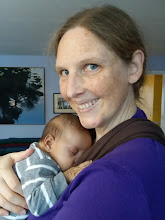Giving light
Today I am thankful for the darkness, the relative darkness, of this day. The gathering low clouds and muggy stillness of the air set today apart from that other September day now thirteen years ago, which (where I was, on a mountainside in Maine) was crisp and flawlessly blue. In the shadow of this date I am thinking of anniversaries. When the planet comes back to same place in space, or at least the same position relative to the sun, how we feel the return in our bones. The emotional cargo that attached to these temperatures, these daylengths, also comes rushing back.
This coming year will be freighted with heavy anniversaries for me: the sudden death of Peter Ohring, colleague and friend, last November. The (write it!) suicide of my aunt in May. The tragic accident that took my college friend Nadia Seiler in August, two weeks before she would have been married. I’ve been thinking about how, as we get older, the calendar fills up with these disappearances, dark spaces in the Earth’s orbit that tug at us like phantom limb pain as we pass.
At the end of Nadia’s memorial service last weekend, there was a slide show of her brief and amazing life, and the music that her family chose to go with it was from her senior recital at Carleton. She played the cello and I accompanied her on piano. When I heard the music start I could picture those long afternoons in the practice rooms, laughing with Nadia and worrying about small things that are now long forgotten. I can picture the cover of the sheet music but I have no idea what it was called. It was a deceptively simple melody, with such a depth of sadness. I don’t know how we captured that, at those ages, 21 or 22, when all the great wordless sorrows still lay ahead of us. Maybe those dark spaces are in us always, and we only notice when the events of life bring them to the surface.
But this metaphor of dark = loss = sadness is too facile. Darkness is necessary for light to be perceptible. It’s the darkness between the stars that shows us the nature of our finite universe. In these moments when the dark surfaces, we must be most aware of the light in our lives and our ability to give light to others. Hope is most necessary when it seems least justified.
As an educator, I try to give light. I want to build a world with more understanding, more compassion; a world where everyone can feel valued and empowered, while understanding the consequences of their actions and taking responsibility. The root of the word “educate” comes from the Latin educare, meaning “to lead forth.” I want to be a beacon, lighting up a pathway towards a better world. Maybe I fall short of this. Well, of course I fall short. But the ideal is powerfully important.
La utopía – Eduardo Galeando
Ella está en el horizonte.
Me acerco dos pasos,
ella se aleja dos pasos más.
Camino diez pasos
y el horizonte se corre
diez pasos más allá.
Por mucho que yo camine
nunca la voy a alcanzar.
¿Para qué sirve la utopía?
Sirve para eso:
para caminar.
Utopia (my not-very-polished translation)
It’s on the horizon.
I take two steps forward,
and it retreats two steps.
I take ten more steps
and the horizon goes on
ten steps further.
I could walk forever
and never reach it.
What’s it good for, then, this utopia?
It’s for this: for walking.
Y seguimos caminando hacia el horizonte, un paso a la vez, iluminando el camino de los demás.


2 Comments:
Wow, Susan, powerful as ever. Thanks for sharing!
Thanks for this, Susan. Lots of love from California - Rachel Colwell.
Post a Comment
<< Home